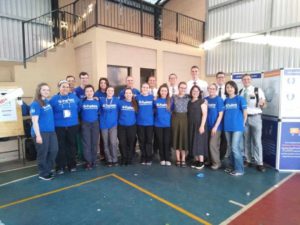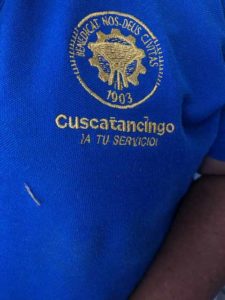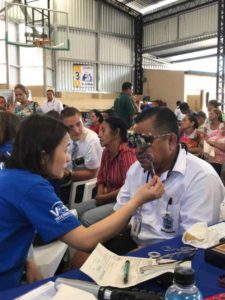El Salvador March 10-16, 2019
VOSH trip to El Salvador 2019
This was VOSH trip number 14 for Dale and me. VOSH has allowed us to be more than merely beach-sitting tourists. Don’t get me wrong, I love being a tourist and I occasionally sit on a beach for a few minutes. I love helping people too. VOSH has allowed me to combine travel and helping people. On this trip, I also was able to practice my Spanish language skills with some very patient people.
In El Salvador we are hosted by FUDEM (Fundacion para el desarollo del la mujer Salvadorena, Foundation for the Development of El Salvadoran Women). This is a non-traditional VOSH trip because we do not distribute used eyeglasses. The eye examinations are free of charge and are traditional VOSH style. FUDEM is happy to host VOSH groups to participate in their social development clinics. Students are always welcome.
At social development clinics, FUDEM provides new, custom eyeglasses to all participants, regardless of their ability to pay. This year a single vision pair of distance glasses cost $10 and a line bifocal $15. If they cannot pay, then they tell the optician and they will get a basic pair of eyeglasses for free. Most participants can pay for a basic pair. They can upgrade their lenses to anti reflective, photochromic, and/or progressive (no line). All of the frames on display are the same price. The orders are written up with frames attached. Another team will return in about a month with to dispense the eyeglasses.
As for my personal experience, a new record was set for number of patients seen by our group in one day: 1275. The previous record for a clinic that I participated in was about 890 in Nicaragua with VOSH Connecticut. Those are big days. Crowd control is critical when seeing large numbers of patients, especially over 600 or so. That day we did have a couple of lines of patients get tangled up. The line for the autorefractor was too long and wound around the waiting area chairs with the end nowhere to be found. FUDEM staff straightened it out. Later the consult line, waiting to see the doctor, extended past the autorefractor and began to mix with the autorefractor line. FUDEM staff fixed that too.
The patients that I will remember from this trip include the 12 year old young man with early keratoconus in his right eye. Fortunately FUDEM has permanent clinics staffed with ophthalmologists. They have corneal crosslinking available at their clinic in San Salvador. Only one of the FUDEM optometrists knew what I was talking about but one was all I needed to get him referred to the right place. He was an interesting case for the students to learn from. I also remember the gentleman with RK and perpetually dry red eyes. No one could tell me if Brimonidine is available in El Salvador. We are not allowed to prescribe there anyway. So I wrote it down for him to discuss with ophthalmology. I hope he can get some and that it helps him. He was very happy to let the students learn from his case, in the name of science. I also remember the angle closure. Again, a good learning experience for the students. One student remarked “It really does feel like the end of your nose.” We seem to see an angle closure every year in El Salvador. We saw her in the afternoon and she was to be seen by ophthalmology the next morning.
This trip was bitter sweet because it was my last trip to El Salvador to work with FUDEM. When I first started working with FUDEM, I wanted to provide a VOSH trip opportunity for the students enrolled in the AODP (Accelerated Optometric Degree Program) at NECO(New England College of Optometry). When I participated in this program (formerly called POD) there was no SVOSH trip opportunity because of the volunteer time that was required before participating in an SVOSH trip. Unfortunately, NECO has discontinued the AODP program and, therefore, I am not planning to return to El Salvador to work with FUDEM.
-Julie L. Walsh, O.D., Ph.D.



